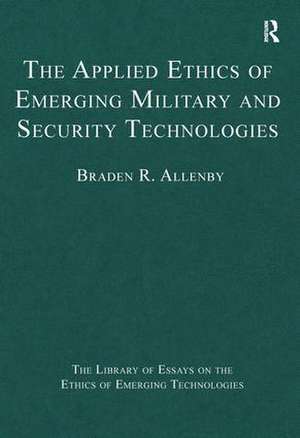The Applied Ethics of Emerging Military and Security Technologies: The Library of Essays on the Ethics of Emerging Technologies
Autor Braden R. Allenbyen Limba Engleză Hardback – 28 apr 2015
Preț: 1419.14 lei
Preț vechi: 1978.08 lei
-28% Nou
Puncte Express: 2129
Preț estimativ în valută:
271.59€ • 282.49$ • 224.21£
271.59€ • 282.49$ • 224.21£
Carte tipărită la comandă
Livrare economică 14-28 aprilie
Preluare comenzi: 021 569.72.76
Specificații
ISBN-13: 9781472430038
ISBN-10: 1472430034
Pagini: 530
Dimensiuni: 174 x 246 x 40 mm
Greutate: 1.27 kg
Ediția:1
Editura: Taylor & Francis
Colecția Routledge
Seria The Library of Essays on the Ethics of Emerging Technologies
Locul publicării:Oxford, United Kingdom
ISBN-10: 1472430034
Pagini: 530
Dimensiuni: 174 x 246 x 40 mm
Greutate: 1.27 kg
Ediția:1
Editura: Taylor & Francis
Colecția Routledge
Seria The Library of Essays on the Ethics of Emerging Technologies
Locul publicării:Oxford, United Kingdom
Cuprins
Contents: Introduction. Part I Changing Context and Overview: The implications of emerging technologies for Just War theory, Brad Allenby; The ethics of killer applications: why is it so hard to talk about morality when it comes to new military technology?, P.W. Singer; Summary, National Research Council and National Academy of Engineering; Unrestricted warfare, Qiao Liang and Wang Xiangsui; International humanitarian law and the challenges of contemporary armed conflicts, International Committee of the Red Cross; Technology as dialectic: understanding game changing technology, Noetic Corporation; New capabilities in warfare: an overview of contemporary technological developments and the associated legal and engineering issues in Article 36 weapons reviews, Alan Backstrom and Ian Henderson. Part II Robots and Autonomous Systems: International governance of autonomous military robots, Gary E. Marchant, Braden Allenby, Ronald Arkin, Edward T. Barrett, Jason Borenstein, Lyn M. Gaudet, Orde Kittrie, Patrick Lin, George R. Lucas, Richard O’Meara and Jared Silberman; Terminating the terminator: what to do about autonomous weapons, Wendell Wallach; On banning autonomous weapon systems: human rights, automation, and the dehumanization of lethal decision-making, Peter Asaro; Losing humanity: the case against killer robots, Human Rights Watch; The case for ethical autonomy in unmanned systems, Ronald C. Arkin. Part III Unmanned Aerial Vehicles and the Transition from Military to Civilian Systems: Pandora’s box? Drone strikes under jus ad bellum, jus in bello, and international human rights law, Stuart Casey-Maslen; Moral predators: the duty to employ uninhabited aerial vehicles, Bradley Jay Strawser; Lawfulness of a lethal operation directed against a US citizen who is a senior operational leader of Al-Qa’ida or an associated force, US Department of Justice; What the drone debate is really about: it’s not privacy or state power, Daniel Rothenberg; The golden age of privacy is over: but don’t blame drones, Brad Allenby. Part IV Cyberconflict and Cybersecurity: Computing ethics War 2.0: cyberweapons and ethics, Patrick Lin, Fritz Allhoff and Neil Rowe; Cyber conflict and international humanitarian law, Herbert Lin; Jus in silico: moral restrictions on the use of cyberwarfare, George R. Lucas Jr.; The ethics of cyberwarfare, Randall R. Dipert; ‘Cyberation’ and Just War doctrine: a response to Randall Dipert, James Cook. Part V Genomics and Neuroscience Engineering: Enhanced warfighters: a policy framework, Maxwell J. Mehlman, Patrick Lin and Keith Abney; National security neuroscience and the reverse dual-use dilemma, Gary Marchant and Lyn Gully; A multidisciplinary approach to an ethic of biodefense and bioterrorism, Victoria Sutton. Name index.
Notă biografică
Braden R. Allenby is Lincoln Professor of Engineering and Ethics, and President’s Professor of Civil, Environmental and Sustainable Engineering, and of Law, at Arizona State University, USA. He is the founding director of the Center for Earth Systems Engineering and Management, and the founding chair of the Consortium for Emerging Technologies, Military Operations, and National Security, at Arizona State University, USA.
Descriere
The complex ethical issues which arise from accelerating technological change in the military and security domains are the focus of this collection. The essays take account of the context of rapidly shifting geopolitical and strategic frameworks as well as the spread of many technologies from military and security arenas to civil society, with consequences for core values such as privacy, security, criminal behaviour and state police power. Specific technologies and issues are highlighted, ranging from autonomous robotic systems and unmanned aerial vehicles to cybersecurity, cyberconflict and biotechnology.
